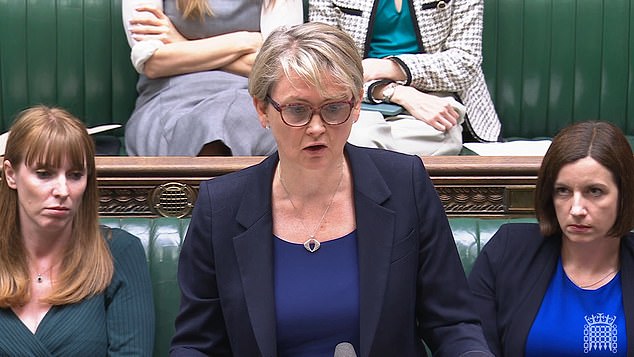Former Tory Cabinet minister-turned-magazine editor, Michael Gove, this week revealed that, as Education Secretary, he had to overrule civil servants who wanted to suppress newspaper revelations about grooming gangs in Rotherham.
The local council requested the government join it in legal action to prevent The Times from publishing details of its ground-breaking investigation into the scandal. Some senior civil servants in his department advised Gove to join in this bid to muzzle the press.
He refused. The report was published – and so in 2011 the British public was able to read more of the horrific truth about the sexual abuse and torture being perpetrated against poor, white, underage teenage girls in numerous provincial towns by gangs of Muslim men of largely Pakistani origin acting with impunity – as those who should have been responsible for their welfare looked the other way.
Dominic Cummings, who was Gove’s special adviser at the time, claims this attempt by civil servants to bury the truth about grooming gangs was not an aberration. It was, he says, systemic across the government bureaucracy: ‘There were mass cover-ups of the whole thing in Whitehall.’
There are good grounds for regarding the grooming gangs, for so long allowed to indulge in their evil scot-free, as the greatest scandal in the history of modern Britain. Yet here we learn that the response of the Civil Service was not just to sit on its hands but to try to stifle attempts to reveal the truth. No wonder Cummings says Whitehall wanted a national inquiry into the gangs, belatedly granted this week by Keir Starmer, like a hole in the head.
It is yet another stain on the reputation of an institution that was once regarded as the Rolls-Royce of public administration – a trusted, efficient, superbly competent machine, run by highly-educated people committed to public service, that purred away, keeping the country in sound hands even when the politicians didn’t really know what they were doing.
These days few see the Civil Service in that glowing light. A lamentable decline in the quality of those working in it has been matched by decline in its work ethos, decision-taking and ability to administer.
Barely a week goes by without fresh evidence of a service riddled with incompetence, back-covering, increasing Left-wing bias in a workforce that’s meant to be impartial and debilitating lassitude, amplified by its determination still to work from home long after the Covid crisis has ended.

Home Secretary Yvette Cooper said she will commission a national inquiry into the grooming gangs
Only this month we learned of further setbacks for the HS2 rail project, the country’s biggest-ever state-run and financed infrastructure programme. The London to Birmingham line, originally estimated back in 2012 at £20 billion, will end up costing closer to £60 billion. Originally planned to come into service next year, that date was soon pushed back to early in the next decade.
The latest target is now 2035. But we cannot be sure even that deadline will be met. Such is the ‘litany of failure’ surrounding the project the transport department, which has effectively lost control of it, thinks it prudent not name a completion date.
This year, the House of Commons Public Accounts Committee said it was a ‘textbook example of how not to manage a project’.
The Ministry of Defence is no stranger to that scale of cock-up. It’s hidden in the mists of time when it last completed a major military procurement project anywhere near on time or on budget.
It has become a byword for the incompetent squandering of taxpayers’ money – a disease that increasingly infiltrates most government departments these days.
Nor is the Civil Service that good at raising the revenue needed to pay for its incompetence. Only this week it was revealed that HMRC has ‘lost control’ of collecting corporation tax from small businesses. Of the almost £37 billion HMRC estimated it was owed in 2023-24 only £22 billion was collected – a 40 per cent shortfall.
It’s not that we’re short of civil servants. Indeed, we’re awash with them. Eighteen years of Conservative government under Margaret Thatcher and John Major cut it to a then post-war low of almost 440,000. Under Tony Blair and Gordon Brown it crept up again to 520,000.
The so-called ‘years of austerity’ under David Cameron and George Osborne saw numbers fall once more – only to bounce back to almost 520,000 again under subsequent Tory prime ministers. Within that overall rise there are more expensive ‘chiefs’ than ever: senior Civil Service positions are up almost 70 per cent since 2013.

A feature by the Daily Mail’s Sue Reid from 2010 about predatory grooming gangs
But productivity is way down. The public sector is 8 per cent less efficient than in pre-Covid 2019, which means the taxpayer now pays more for less across a broad front of public services – nowhere more so than in the NHS, where productivity is down 20 per cent on six years ago – a slide health department civil servants have proved powerless to stop.
Of course the politicians must take their share of the blame. The current crop on both sides of the Commons are pretty low grade and these days they rarely stay long enough in the job to get a grip on their bureaucrats.
In the 1970s, the average tenure of a Cabinet minister in one post was 60 months. Under the Tories it had declined to under 40 months before they were kicked out last summer. No wonder civil servants are able to rule the roost over rookie politicians. Yet never have they been less qualified to wield such power. The best and the brightest no longer see the Civil Service as an attractive career route. It has become a job choice for the mediocre, the plodders and those with a disdain for the profit-making private sector.
Even the Cabinet Office, at the heart of government and once populated by high-fliers, is a shadow of its former self. Nobody seems sure what it does any more but it has a formidable human resources team to ensure best ‘woke’ practice across the service.
The chances of being fired from any Civil Service job for incompetence are close to zero. Only 0.5 per cent of the overall headcount in any one year are dismissed on any grounds. Even political activism won’t derail your career. Under the Tories, mutinous civil servants at the Home Office opposing the deportation of migrants to Rwanda put up posters comparing Paddington Bear to an illegal immigrant as part of a ‘refuse to work on policy’ protest.
The Foreign Office is riddled with pro-Palestinian supporters bridling at the government’s refusal to be tougher with Israel. No LGBTQ+ protest is complete without a large Civil Service contingent. Civil Service unions now take governments to court if they don’t like a policy.
Working from home, from which a huge chunk of the Civil Service refuses to budge, has made everything that ails the bureaucracy worse. It makes reform well nigh impossible and, in any case, the Left-wing Civil Service unions increasingly call the shots, sitting across Whitehall as huge roadblocks to reform. The politicians are scared to tackle them.
Yet pay structures and career paths are a mess. Some are paid too much, others too little. Activist HR managers and various levels of bureaucracy can make promotion difficult for those who just want to get on.
The cost of civil servant pensions is astronomical: it is nothing short of astounding that those earning less than £40,000 will actually be better off on their pensions when they retire.
There are, of course, no votes in Civil Service reform – and the prospect of a lot of pain when the unions fire up the resistance. But no incoming government on a mission to change our country has much of a chance with an unreformed Civil Service. So what is to be done?
A study of Singapore would be instructive: its Civil Service is small on a per capita basis but efficient and well-paid (the head is on almost £1 million a year).
It will be no easy task to reconstruct our Civil Service along similar lines. But small, efficient and highly-paid would seem a good place to start.











